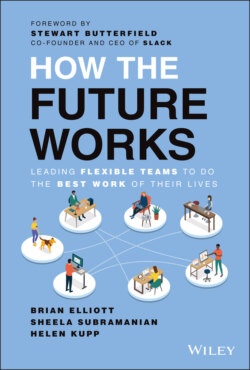Читать книгу How the Future Works - Brian Elliott - Страница 6
Foreword
ОглавлениеIn March of 2021, about a year into the pandemic, Slack's executive team was dialed into our regular weekly staff meeting. We were 45 minutes into what was becoming a very frustrating conversation about office reopenings, remote work policies, time zone guidelines for hiring plans, regional compensation adjustments, and a host of other topics that are by now quite familiar to company leaders in nearly every industry.
We were talking past each other, seemingly disagreeing about the most basic aspects of the future we imagined, until our Chief People Officer, Nadia Rawlinson, stopped the conversation: “Hold on: when you ask ‘what's going to be different?’ are you talking about different from February 2020? Or different from today? It matters because the answers take you in opposite directions.”
She was right. Human brains love shortcuts, and it is much easier to imagine the future as just like the past, except for one small difference. For every “we'll go into the office two days each week,” there's an implicit assumption: “… but otherwise things will be more or less the same as February 2020.” But that assumption is wrong, not least of all because it presupposes every employee lives within commuting distance of an office. The world has already moved on.
When you think about the future of work as evolving from our present “normal,” things look quite a bit better. Starting from the baseline of the surprisingly impressive performance we've seen with nearly every office worker working from home, we get two new, big advantages. The first, as the pandemic subsides and we learn to better negotiate the ongoing risks and trade-offs, will be a fuller return of the amenities of regular life. More travel, more togetherness, and less risk to our physical health will mean better mental health and happier lives for all.
The second advantage will be the return of in-person communication and collaboration as one of the tools available for us to get work done. This will help in forming relationships, building trust, and approaching certain kinds of creative work. Even after the pent-up demand for seeing colleagues in person subsides, regular time spent together face-to-face will play a key role in the experience of most knowledge workers, including most of those who otherwise prefer to work remotely 100% of the time.
Nadia's question shifted the conversation into the kind of engaged debate that was more characteristic of our normal discussions. In subsequent conversations with dozens of customers, along with fellow software CEOs and industry observers, I've noticed increasing receptivity to an optimistic and open-minded approach to the future of work.
The pandemic highlighted the fact that most organizations had already switched from a mode of operation where digital technologies supplemented in-person communication, to a world where in-person supplements the digital. Now we just need to get our mindsets caught up to that Digital-First reality.
The opportunity we have today is enormous. No adage has proven itself more true in my career than “never waste a crisis,” and no crisis has been bigger than this. This is a chance to reimagine how work gets done, to break bad old habits, and make work better for people and companies.
Like the scientists say, you can't unscramble an egg. We need to start thinking about the future we want, given where we are today. We need to avoid falling back to assumptions about a familiar remembered past that is not coming back. My hope is that more leaders will think about this time—and the unforeseeable set of circumstances—as an invitation to get creative, to experiment, to invent, and to take advantage of what will surely be the biggest single opportunity we'll have in our lifetimes to make fundamental changes to how we work. And helping leaders navigate the way forward was one of the reasons I was excited to help launch Future Forum, a consortium backed by Slack.
We all know that work can be more fulfilling, less stressful, more pleasant, and more productive. The purpose of this book is to help you make that happen.
— Stewart Butterfield, co-founder and CEO of Slack
